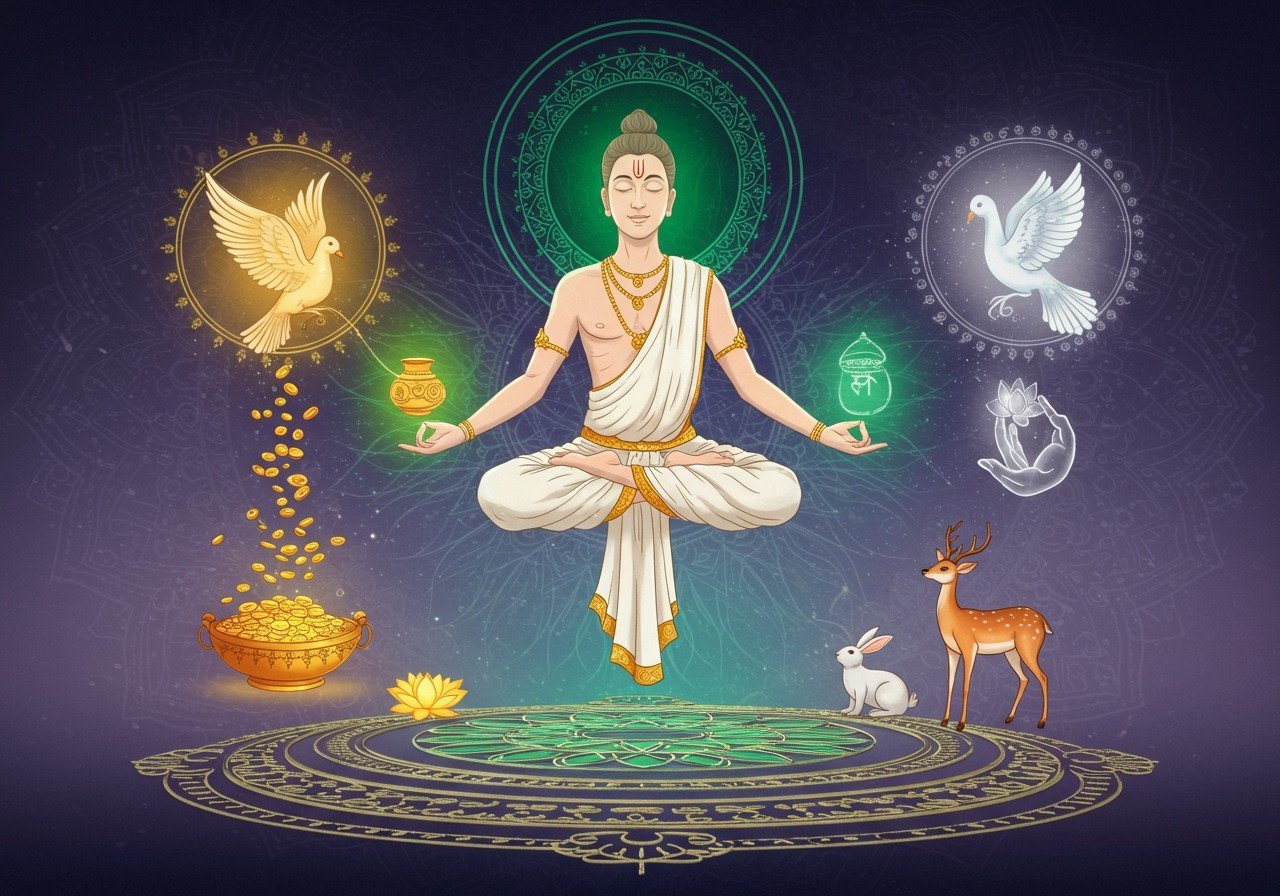
The Yamas, ethical guidelines from Patanjali’s Yoga Sutras, offer a path to enhance our personal conduct and foster social harmony. These ancient principles, including non-violence (Ahimsa), non-stealing (Asteya), and non-attachment (Aparigraha), hold profound wisdom for navigating modern life. This blog post delves into these three Yamas, providing practical advice on incorporating them into our daily routines, resonating deeply with culturally rooted Indians who cherish tradition and seek authenticity.
Understanding Ahimsa: Embracing Non-Violence
Ahimsa, often understood as non-violence, encompasses far more than merely refraining from physical harm. It’s about cultivating compassion and empathy for all living beings, fostering kindness in our words and consideration in our deeds. This creates a ripple effect, nurturing peaceful communities. In today’s world, Ahimsa is paramount in addressing conflicts, aligning beautifully with the vegetarian lifestyle embraced by many Indians. It also connects with anekantavada, the Jain principle of respecting diverse perspectives. Practical ways to embrace Ahimsa include communicating mindfully and resolving conflicts with understanding.
- Think before you speak – Is what you’re about to say kind, necessary, and true? Could it cause harm, even unintentionally?
- Seek to understand others’ viewpoints – Even when disagreements arise, try to see the situation from their perspective. This fosters empathy and encourages peaceful resolution.
Decoding Asteya: Beyond Non-Stealing
Asteya, or non-stealing, goes beyond simply not taking what doesn’t belong to us. It involves respecting others’ time, ideas, and attention – valuable resources that deserve our consideration. In professional life, Asteya translates to acknowledging collaborators and respecting intellectual property. In our personal relationships, it strengthens bonds of trust and respect. On a deeper level, Asteya nurtures contentment within us, lessening feelings of envy and greed. While both Asteya and Aparigraha relate to our relationship with possessions, they offer distinct perspectives on material attachment. To cultivate Asteya in your life, try gratitude journaling and mindful consumption.
- Be grateful for what you have – Regularly acknowledging your blessings helps you appreciate your current situation and reduces the desire for more.
- Consume consciously – Before purchasing something, ask yourself if you truly need it or if it’s simply a fleeting want. This promotes thoughtful spending.
Embracing Aparigraha: The Art of Non-Attachment
Aparigraha, the practice of non-attachment, empowers us to let go of material desires that don’t serve our higher purpose. This can lead to financial freedom by curbing excessive consumerism. It also helps declutter our physical spaces and, more importantly, our minds. Aparigraha encourages a simpler, more minimalist lifestyle, offering emotional benefits like increased focus and inner peace. It’s not about renouncing all worldly possessions, but rather about using them wisely and mindfully in our modern lives. Practical steps towards Aparigraha include discerning needs versus wants and fostering a generous spirit.
- Differentiate between needs and wants – A need is something essential for your well-being, while a want is often driven by desire. Understanding this difference empowers you to make conscious choices.
- Give freely – Whether it’s your time, resources, or simply a kind word, giving to others shifts the focus from acquiring to sharing, fostering contentment.
Integrating the Yamas: A Holistic Approach
Ahimsa, Asteya, and Aparigraha are interconnected principles, each supporting the others in creating a balanced and fulfilling life. Practicing one Yama often naturally leads to the embodiment of the others. They enrich our personal and professional relationships by promoting integrity, respect, and compassion. These Yamas resonate deeply with Indian cultural traditions and rituals, holding timeless relevance for contemporary living. To integrate these Yamas into your daily life, set clear intentions, practice mindfulness, and seek out supportive communities.
Meditation and Mantras: Your Path to Inner Peace
How Poojn.in Supports Your Spiritual Journey with the Yamas
At Poojn.in, we offer a thoughtfully curated selection of items that support your practice of Aparigraha, Asteya, and Ahimsa, helping you weave these principles into the fabric of your daily life.
For Your Aparigraha Practice:
- Simple Cotton Yoga Mats: Crafted from natural materials, these mats encourage a minimalist approach to your yoga practice. Discover our Corpus Cotton Yoga Mats.
- Basic Meditation Cushions: These cushions provide comfortable support for your meditation, promoting simplicity and focus.
- Eco-friendly Prayer Items: Support sustainable living with our selection of eco-conscious prayer items, reducing your environmental impact.
For Your Asteya Practice:
- Fair-trade Certified Puja Items: Ensure ethical sourcing with our fair-trade puja items, supporting fair labor practices.
- Ethically Sourced Ritual Materials: Our commitment to ethical sourcing extends to all our ritual materials, promoting transparency and responsible consumption.
- Transparent Pricing: We believe in honest and transparent pricing on all our products, ensuring fair value for your purchase.
For Your Ahimsa Practice:
- Cruelty-free Ritual Items: Practice Ahimsa with our cruelty-free ritual items, respecting all beings.
- Organic Cotton Prayer Shawls: Embrace natural comfort with our organic cotton prayer shawls, made with care and compassion. Explore our Puja Kits.
- Chemical-free Incense and Dhoop: Enhance your spiritual practice with our chemical-free incense and dhoop, promoting a healthy and pure environment.
Visit www.poojn.in to explore our complete collection of authentic ritual items. Need personalized guidance? Call us at 03369029784 or WhatsApp 9476142738. We ship across India and offer secure online payment options. All our products come with quality assurance and usage instructions to support your spiritual journey. Poojn.in maintains rigorous quality control, ensuring you receive genuine items that meet traditional standards while upholding ethical business practices.
Conclusion: Living the Yamas Daily
Integrating the Yamas—Ahimsa, Asteya, and Aparigraha—into our daily lives enriches our spiritual journey. These principles guide us towards a life of compassion, respect, and balance. Ahimsa nurtures peace and empathy, Asteya teaches honesty and gratitude, and Aparigraha cultivates contentment beyond material possessions. Together, these Yamas create a harmonious path, aligned with both ancient Indian traditions and the demands of modern life. Embrace these principles, and discover a fulfilling way to honor your values and enhance your life’s journey.
Yama God of Death and Dharma: A Complete Guide
FAQs on Exploring the Yamas
What is the difference between Aparigraha and Asteya? Aparigraha focuses on non-possessiveness, releasing the grip of material desires, while Asteya centers on non-stealing, respecting the belongings of others. Both guide us towards a simpler, more honest way of living. They teach us to value what we have and respect the rights of others.
How are Ahimsa, Aparigraha, and Anekantavada related? These three concepts beautifully intertwine. Ahimsa, or non-violence, promotes harmonious living, Aparigraha emphasizes non-attachment, and Anekantavada, a Jain principle, encourages respect for diverse viewpoints. Together, they foster a world where respect, understanding, and peaceful co-existence thrive.
Is Aparigraha a Yama or a Niyama? Aparigraha is one of the five Yamas, ethical guidelines in yoga philosophy. Yamas offer guidance on our interactions with the world and those around us, promoting ethical behavior and social harmony.
Why is Asteya important in daily life? Asteya is crucial for building trust and integrity in all our interactions. By refraining from taking what isn’t ours, we cultivate honesty in our actions and relationships. This builds a foundation of respect and responsibility, both personally and professionally.
Can practicing Ahimsa lead to a peaceful life? Absolutely. Practicing Ahimsa, or non-violence, fosters peace within ourselves and in our interactions with others. By cultivating compassion and empathy, we reduce conflicts and create a more positive, harmonious environment. This inner peace radiates outwards, influencing our relationships and community.
How can one practice Aparigraha in modern life? In today’s consumer-driven society, practicing Aparigraha might involve decluttering our homes and minds, focusing on experiences rather than material possessions, and choosing to live more simply. It’s about appreciating what we have rather than constantly striving for more.
What are the benefits of following Aparigraha, Asteya, and Ahimsa? Embracing these Yamas can lead to a more fulfilling and meaningful life. They teach us to live with simplicity, honesty, and peace, reducing stress, improving our relationships, and fostering inner happiness. These principles offer a pathway to a more balanced and joyful existence.
Karma in Hinduism: The Law of Cause and Effect Explained


